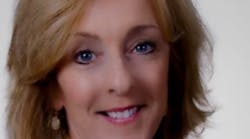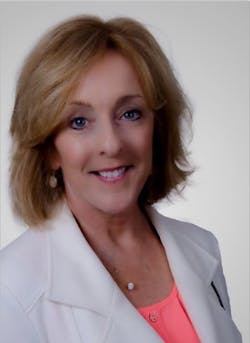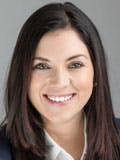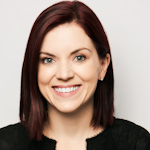Professor perspective: An interview with Marianne Dryer, MEd, RDH
We all know that professors of dental hygiene possess a wealth of information. But what you might not know is how much professors can help in making sense of our journeys following graduation.
Recently, I had the chance to talk with Marianne Dryer, MEd, RDH, a dental hygiene professor at Cape Cod Community College in West Barnstable, Massachusetts. We discussed her choice to become an educator, how hygienists should approach the early stages of their careers, and the biggest opportunities for new graduates. Read on to learn more!
Interview with Marianne Dryer, MEd, RDH
Where do you teach now?
I teach at Cape Cod Community College in West Barnstable, Massachusetts.
What subjects do you teach?
I teach Dental Hygiene III Theory, which involves research methodology and case-based instruction. I also teach oral tissues, embryology, and histology.
I have also been a first-year coordinator at a dental hygiene program at Collin College in McKinney, Texas, for many years, which has been incredibly rewarding.
Why did you become a dental hygienist?
My entire life I dreamed of being a teacher. When I graduated high school in 1980, there was a surplus of teachers. In the eighties, women could find more career options and tracks to choose from in academics.
I believe it is hard to know at 18 what a young person wants for his or her career. It's such a major decision that does not come easily to all.
I began my college path in teaching, but I was visiting my dentist during the holidays after my first semester, and he had a hired a dental hygienist for the first time. I was so taken with her. I admired her role in the office and the private interaction she was able to have with me. It was life-changing, and I remember the feeling of "I want to do this."
I applied for acceptance into the Forsyth School for Dental Hygienists and was accepted into the graduating class of 1983.
It's a long answer to the question, but the story here is that I returned full circle to what I ultimately wanted to do in my heart. I live my passion and feel like I have it all.
In addition to teaching, what else do you do during the week?
I had the opportunity to work in the corporate world as a dental educator and curriculum developer with Dentsply Sirona for five years, and the experience was exceptional. I am now an independent speaker and consultant focusing mainly on instrumentation and risk assessment. I speak to dental and dental hygiene associations, local components, and large group practices, which is incredibly rewarding.
What is the best part about your job?
When I first began teaching in 2001, I will never forget the feeling of looking at the clock and thinking, "Oh no, I only have another hour left with the students." It's a different feeling than, "When is the day going to be through." Mindset is critical to one’s happiness. As professionals, we should listen to our inner voices as callings to pursue further career fulfillment.
I truly love every part of my job. It's an honor to teach—one that I have never taken lightly. I prepare to a fault sometimes. When students or clinicians place their mind sin your care and you are responsible for those minds, you must be current, thorough, and give students your best. That should be a challenge and a reward every single semester. I love that challenge.
What is a study tip that you can offer our students?
I would advise students to record lectures, create their own study guides and be their own advocates of learning. The art of seeking help from advisors and faculty is essential to cultivate for career advancement in general. I am more than happy to help any student who approaches me with earnest desire to learn, be assisted with their skill development, and, frankly, can demonstrate gratitude for the faculty members' time.
I believe most teachers are in the profession because they want to make a difference. Learning only takes place when a student's mind is open to instruction and the faculty member feels valued. Students certainly have rights to the best education they are paying for, but as with any relationship, mutual respect must be present for learning to occur.
What is the No. 1 mistake new graduates make?
Interesting question. I truly believe most graduates are experiencing a certain level of PTSD, or post-traumatic stress disorder. What most people do not and will never understand is the difficulty of the program and the stress involved with national and regional boards.
Take the time to congratulate yourselves for a remarkable accomplishment, a journey well done, and a step towards an exciting future. There is something to be said for leaving the past behind, and one can discuss the complexity of the dental hygiene program and the unfairness of clinical boards, but until something changes in this area, truly respect the fact that you have completed an extremely difficult curriculum and are entering an association of incredible, inspirational colleagues.
Some may answer this question with, "Take your time pursuing the office or position that best suits you as a new graduate." Realistically, that's not always possible depending on where you live and the job market. Network immediately post-graduation through your local association so that opportunities are available to you while you are seeking the right position. It is a necessity for your career, not a luxury, and although earning income is most certainly front and center to many, realize you are developing a career, not just a job, and it takes a certain savvy mindset to know the difference.
What is one piece of advice you would like to give our readers?
Do not work in a silo. Become a member of your local, state, and national association right away. Become involved so you are part of your career development and not a byproduct of it. I cannot stress that enough and recognize the need for support, continued learning, and professional development amongst colleagues. You will not be clinically confident for many years. Learn and be open to the RDHs around you. We all start somewhere, and you will make mistakes. Recognize it’s a softer fall when others are there to support you.
Realize this is not the end of a difficult learning period, but the beginning of new learning at a different level of ownership: yours. This shift is critical to make as a new graduate, for now you are in control of your performance and outcomes. Your patients will depend on you for the care and status of their oral health. This alone should be the vehicle for pursuing lifelong learning and developing clinical expertise.
Editor's note: This interview has been edited for length and clarity.
More about Marianne Dryer, MEd, RDH
Marianne Dryer is a dynamic speaker, educator, and corporate consultant in curriculum development. She has lectured nationally and internationally on periodontal instrumentation with a focus on ultrasonic technique, risk assessment, infection prevention and radiology technique.
Marianne is a graduate of the Forsyth School for Dental Hygienists (now Massachusetts College of Pharmacy and Health Sciences), where she earned associate of science and certificate in dental hygiene in 1983. She attended Old Dominion University, where she earned a bachelor's in dental hygiene in 1985, and St. Joseph’s College of Maine, where she earned a master's in education in 2007.
Marianne is also a periodontal instrumentation instructor for DH Methods of Education Inc., an educational program for dental and dental hygiene faculty. She has been a strong advocate for introducing ultrasonic instrumentation into dental hygiene cirricula earlier and with more structured, foundational content.









